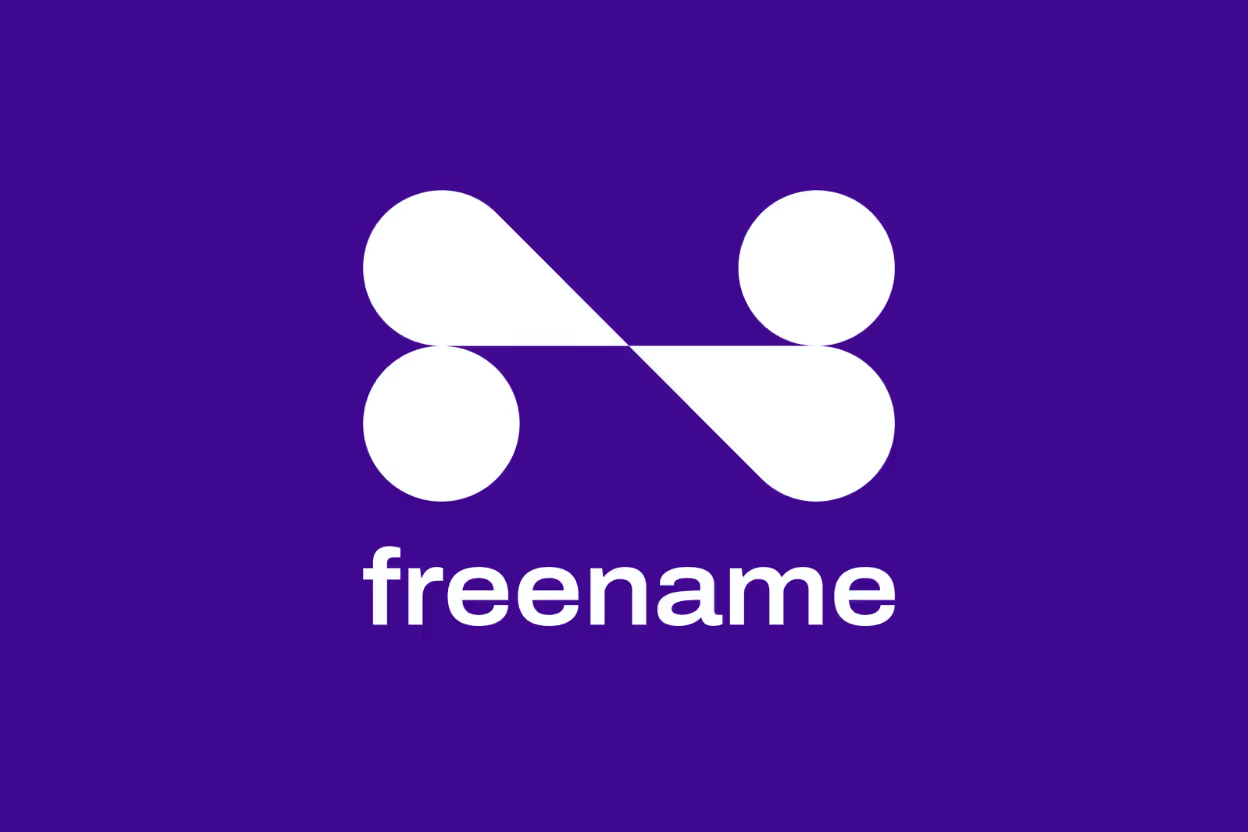In the Web3 world, domain naming systems like Freename and ENS play a critical role in how users and businesses establish identities on blockchain networks. Both offer blockchain-based domain names, but they approach ownership and control differently. For founders and investors, understanding these differences means making informed choices about security, decentralization, and long-term potential.
Freename represents an important step forward with a model designed to put ownership firmly in the hands of users. This post will clarify what sets Freename apart from ENS and why that difference matters for anyone building the future of decentralized applications and services.
Overview of ENS (Ethereum Name Service)
Before comparing Freename and ENS, it's important to understand what ENS brings to the table. ENS has established itself as the go-to naming system on Ethereum, giving users a way to replace complex wallet addresses with simple, human-readable names. This shift simplifies blockchain interactions, but like any early technology, it comes with trade-offs. Let's look closer at its key features and the limitations that affect everyday use.
Key Features of ENS
ENS makes blockchain addresses more accessible by mapping them to names that anyone can read and remember. Here are some of its standout features:
- Human-Readable Names: Instead of sharing a long string of letters and numbers, you use names like
yourname.eth. This makes sending and receiving cryptocurrency easier and less error-prone. - Integration with Ethereum Wallets: Most popular Ethereum wallets support ENS, allowing you to use your ENS name directly when sending or receiving funds. This smooth integration helps reduce confusion during transactions.
- Support for Decentralized Websites: ENS can link
.ethnames to decentralized websites hosted on IPFS or other decentralized storage networks. This supports blockchain-based web browsing without relying on central servers. - Flexible Records: Beyond mapping addresses, ENS stores multiple records like content hashes, allowing the same name to serve as your website domain, crypto address, or even other blockchain identifiers.
These features help ENS users enjoy a more user-friendly and multi-functional identity on Ethereum. However, while ENS improved usability compared to raw wallet addresses, there are still areas where it struggles.
Limitations of ENS
ENS is not without its drawbacks, and these affect both newcomers and experienced users:
- Cost and Fees: Registering an ENS name is not free. Users pay yearly renewal fees which vary depending on the name's length and demand. For some, these recurring costs add up, especially if managing multiple domains.
- Complex Registration Process: The process to register and manage ENS names requires interaction with Ethereum smart contracts. This can be confusing and intimidating for users who don't have experience with gas fees or wallet management.
- Governance and Control: ENS governance is decentralized but often criticized for slow decision-making and lack of transparency. This creates uncertainty about future updates and policy changes.
- Potential for Squatting and Speculation: High demand names can be snapped up quickly by speculators, making it hard for real users to acquire preferred names without higher costs.
- Limited Cross-Chain Support: ENS is tightly bound to Ethereum. Users active on other blockchains may find ENS less relevant or slower to support multi-chain identities compared to newer alternatives like Freename.
These factors translate into a user experience that can feel cumbersome or costly, especially for newcomers. Does paying annual fees and navigating smart contract interactions fit well with your project's goals or your users’ comfort levels? Understanding these trade-offs helps weigh ENS against alternatives aiming for more intuitive and cost-effective solutions.
By keeping these strengths and weaknesses in mind, you can better assess how ENS compares with Freename and which option aligns best with your needs.
Introduction to Freename and Its Innovations
Freename is redefining how we think about blockchain domain names by emphasizing user ownership and simplicity. Unlike traditional models that rely on centralized authorities, Freename puts the reins directly into your hands. It's not just another domain service; it’s designed to make domain ownership straightforward, affordable, and secure for anyone involved in Web3 initiatives.
Let's examine how Freename achieves this through its approach to decentralization, cost, and technology.
Decentralization and Control in Freename
Freename’s core strength lies in its decentralized control model. Instead of going through a centralized registrar or having an intermediary control renewal and transfers, Freename empowers users to manage their domain names independently. This means:
- Users hold the private keys that control their domains.
- No third party can freeze or revoke your domain without your consent.
- Ownership transfers happen peer-to-peer without extra fees or delays.
Think of it as owning real estate rather than leasing an apartment. When you own your domain on Freename, you truly control it across the blockchain ecosystem. This eliminates bureaucracy and provides resilience against censorship or unilateral policy changes. How often do you get to own something completely free of middlemen in today’s digital world?
Cost and Accessibility Advantages
Freename takes a fresh approach to pricing domain names. Rather than recurring fees or expensive auctions, Freename offers:
- Low or no annual renewal fees, dramatically reducing long-term costs.
- One-time purchase models or simple renewal structures that don’t catch users off-guard.
- Accessibility for newcomers by simplifying the buying process and reducing transaction complexity.
This model lowers barriers for startups, independent creators, and investors who want meaningful Web3 identities without burning through capital on fees. Why pay ongoing costs when you can secure your domain simply and affordably with Freename? This approach promotes wider adoption and encourages more users to participate in decentralized identity management.
Technological Edge
Freename stands out with smart technological design choices aimed at security, interoperability, and ease of use:
- Cross-chain compatibility: Freename domains can work across multiple blockchains, allowing users to maintain one identity seamlessly wherever they go.
- Enhanced domain security: With on-chain verification and private key management, the risk of theft or hijacking diminishes significantly.
- User-friendly interfaces: Freename simplifies domain registration and management with intuitive tools, lowering the technical barrier often found in blockchain apps.
Such innovations mean you don’t just get a domain; you get a secure identity layer that plays well with the entire Web3 ecosystem. That can be a major advantage when you want your presence to stretch beyond Ethereum or a single network.
Freename’s focus on putting you in control at lower costs with robust, secure technology positions it as a serious alternative for those tired of complicated or costly domain systems.
What would ownership look like if your digital identity was truly yours without intermediaries stepping in? Freename is showing a practical way forward.
Comparing Freename and ENS: What Really Sets Them Apart?
When deciding between Freename and ENS, understanding how users interact with each platform and the strength of their communities is essential. These factors shape not only the daily ease of use but also the platforms’ long-term viability. On top of that, governance and development models play critical roles in determining how each service evolves and maintains trust. Let’s explore these two key areas that truly differentiate Freename and ENS.
User Experience and Community Support
Freename and ENS offer blockchain domain services, but the way you engage with each is quite different.
- Freename focuses on simplicity and clear ownership, giving users control without relying on complicated processes. The interface is designed to be intuitive, minimizing the learning curve for newcomers. Unlike ENS, Freename often avoids yearly fees and complicated renewals, which adds to a smoother ownership experience.
- ENS provides deep integration within the Ethereum ecosystem, which appeals to users already comfortable with Ethereum wallets and dApps. However, the registration process requires understanding smart contracts and gas fees. This can be a hurdle for less technical users or those new to crypto.
Looking at their communities, ENS benefits from a larger, more established user base. It has many developers and companies backing it, creating a rich ecosystem of tools and support. However, that size also means it can be slower to adapt or innovate due to more stakeholders involved.
Freename’s community may be smaller but is typically more focused on user control and ownership rights. This fosters a tight-knit group passionate about decentralization without middlemen. For many Web3 founders, this clear stance means greater confidence in the platform's mission.
If you value straightforward ownership and minimal friction in managing your domain name, Freename’s user experience may appeal more. But if you want broad compatibility and extensive tool support within Ethereum, ENS remains a solid choice.
Governance and Ecosystem Development
Governance models reveal much about how each platform will grow and adapt.
- ENS is governed through a decentralized autonomous organization (DAO), which puts policy decisions and upgrades to a community vote. While this model embodies decentralization ideals, it also means changes can be slow and sometimes contentious. Balancing multiple interests within the DAO may delay initiatives important to users or developers.
- Freename adopts a more direct user-control approach, often emphasizing that domain owners have real, unmediated power over their assets. There is less bureaucracy involved in upgrades or transfers, and the focus remains on ensuring ownership remains with the user, not the platform.
These governance differences affect trust. With ENS, users must trust in a collective governance process that can be unpredictable. Freename’s model feels more like holding the keys to your own domain, reducing risks of policy shifts that might undermine ownership.
In terms of ecosystem development, ENS benefits from being first and well-funded, leading to numerous partnerships and integrations. The DAO approach also allows broad input from various stakeholders, encouraging diverse innovations but sometimes slowing execution.
Freename’s approach fosters rapid development focused on user needs, without waiting for a consensus. This can be a great advantage for founders who want quick updates and a clear path forward without uncertainty.
Understanding these governance and development paths can help you choose a domain platform aligned with your priorities—whether that’s collective decision-making or fast, user-centered control.
Both user experience and governance shape how you will use the platform daily and how confident you feel holding assets there. Freename’s vision centers on true user ownership and simplicity, while ENS offers mature infrastructure backed by community governance. Which fits your project’s goals better for control, development, and trust?
The Future of Blockchain Naming Systems: Why Freename is Poised to Lead
Blockchain domain naming is evolving quickly, and Freename is shaping up as a leading choice for users who want full control, simplicity, and interoperability. As you consider moving beyond ENS or choosing a platform for your Web3 identity, it’s natural to ask important questions about security, integration, risks, and future readiness. This section tackles those queries to make clear why Freename is a strong contender poised for the next phase of blockchain naming.
How secure is Freename compared to ENS?
Security is at the heart of domain ownership. Freename takes a different approach from ENS by focusing on true user control through private key ownership. When you own a Freename domain, you hold the keys directly, reducing chances of third-party interference or censorship. Unlike ENS, where governance changes can affect control, Freename’s model means you alone manage your domain’s fate.
Freename also uses on-chain verification methods designed to prevent hijacking or unauthorized transfers. While ENS benefits from maturity and wide adoption, its reliance on Ethereum smart contracts and recurring renewals introduces some vulnerabilities and costs that do not impact Freename users as much. So, from a security standpoint, Freename’s emphasis on direct ownership offers a clear advantage.
Can Freename domains be integrated with existing wallets and dApps?
Integration matters for convenience and usability. Freename domains are built with cross-chain compatibility in mind, meaning they can interact smoothly with multiple blockchains, wallets, and decentralized apps. This broad support contrasts with ENS, which is primarily designed around Ethereum.
Because Freename embraces interoperability, it allows users to use their domain names across different platforms without being tied to one network. This flexibility makes Freename a better choice for founders and investors who want a unified identity for diverse Web3 projects.
For wallet and dApp developers, Freename’s user-centric protocol simplifies integration because the domains use standard blockchain identifiers accessible by many tools. Ask yourself: would your project benefit from a naming system that plays well across multiple ecosystems?
What are the risks and benefits of switching to Freename?
Switching naming systems involves weighing trade-offs carefully. On the benefit side, Freename offers:
- True ownership without renewal fees, lowering long-term costs.
- Cross-network support that reduces fragmentation of identity.
- A simple management experience tailored for users tired of complicated processes.
However, risks include the current ecosystem size and adoption. ENS has a larger, more established network and more developer tools, which means Freename might face challenges in gaining instant traction. Founders must consider whether the gains in ownership and cost savings outweigh the ecosystem maturity.
Still, the question remains: do you want a system that puts you firmly in control, or one that depends on collective governance that may slow changes or impose fees? For projects prioritizing control and simplicity, Freename stands out.
How does Freename support cross-chain interoperability?
One of Freename's standout features is its commitment to cross-chain interoperability. Unlike ENS, which is Ethereum-centric, Freename domains can be used across multiple blockchains. This means you don’t need separate identities on each chain, providing a more cohesive Web3 experience.
Freename achieves this by implementing universal naming standards and smart contract support tailored for various chains. This design allows you to maintain one domain that links to addresses and assets on different blockchains seamlessly.
In practice, this means your Freename domain can:
- Map to wallets on multiple chains.
- Work with dApps regardless of the underlying blockchain.
- Serve as a portable identity when shifting between projects or ecosystems.
This interoperability prepares users and founders for a future where blockchain ecosystems are more connected, helping avoid the fragmentation currently seen in naming and identity.
Choosing Freename means betting on a future where your name truly travels with you, no matter which blockchain you use for your projects or investments.
Freename addresses key user concerns by offering superior security through direct ownership, broad wallet and dApp integration, and cross-chain functionality. It lowers costs and simplifies control, making it an attractive alternative that challenges ENS’s Ethereum-limited approach.
If you want to learn more about decentralized systems and user control, exploring how Freename delivers real ownership can help you see why it’s positioning itself as the go-to naming system for blockchain founders and investors alike.
Conclusion
Freename and ENS offer distinct models for blockchain domain naming, but the core difference lies in ownership and cost. Freename puts users fully in control with true private key ownership and low or no renewal fees. This direct control minimizes dependency on intermediaries and governance delays, making Freename a more user-friendly and secure option for founders and investors.
Its cross-chain compatibility and simplified management provide a practical identity solution that fits diverse Web3 projects. Meanwhile, ENS remains strong within Ethereum’s ecosystem but carries recurring costs and complexity that can hinder broader adoption.
For those seeking long-term ownership without the constraints of costly renewals or governance uncertainty, Freename represents the future of blockchain naming. It leads the way in making user empowerment and interoperability the foundation of Web3 infrastructure.






